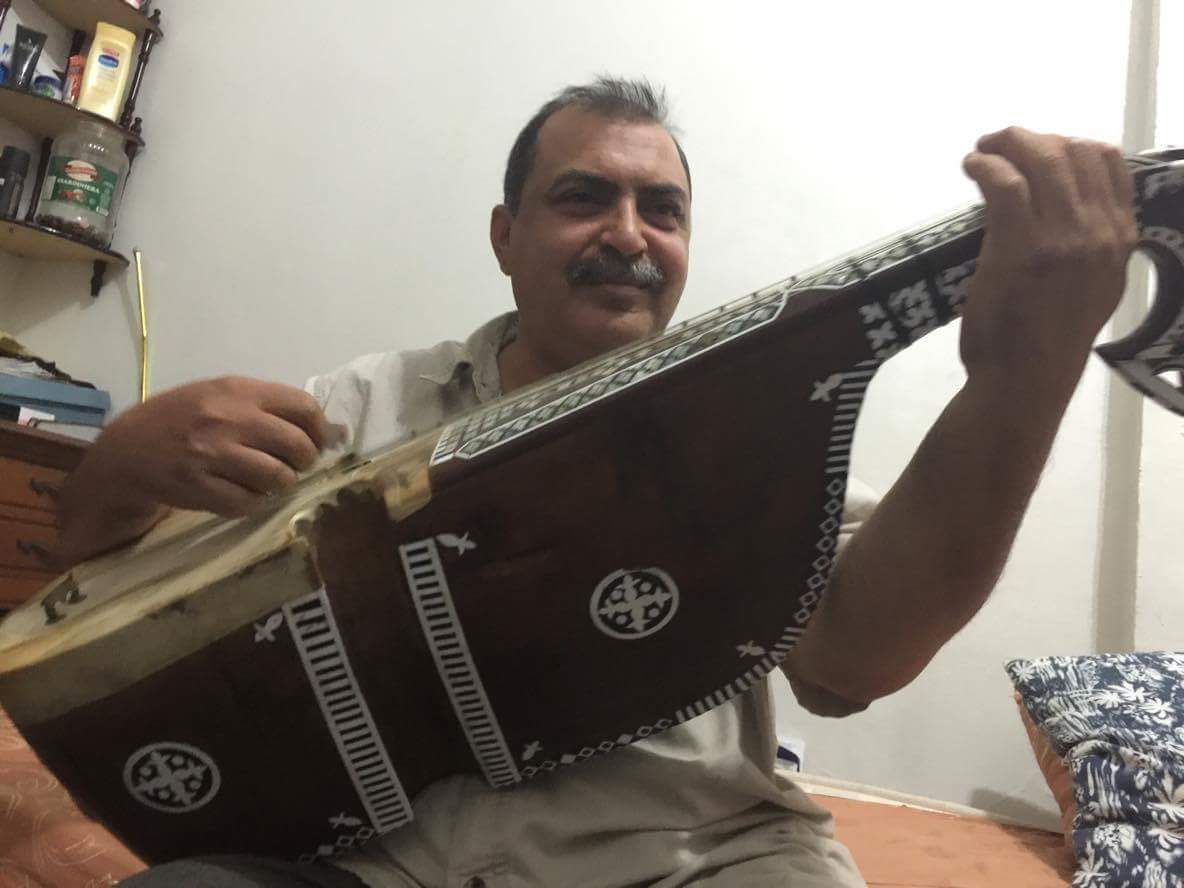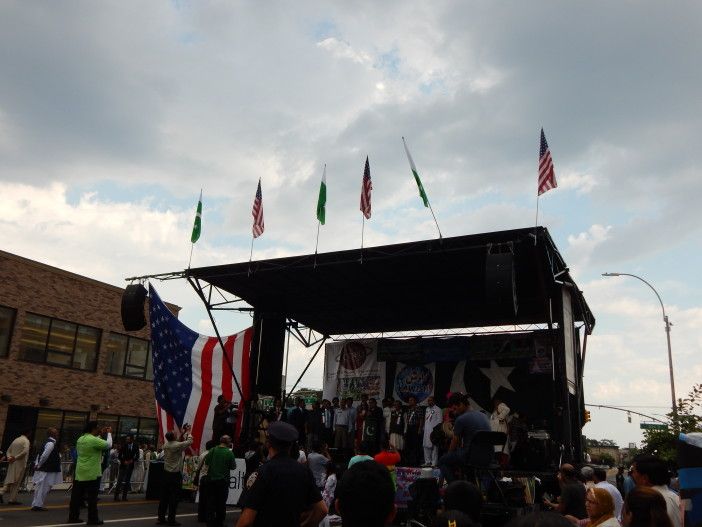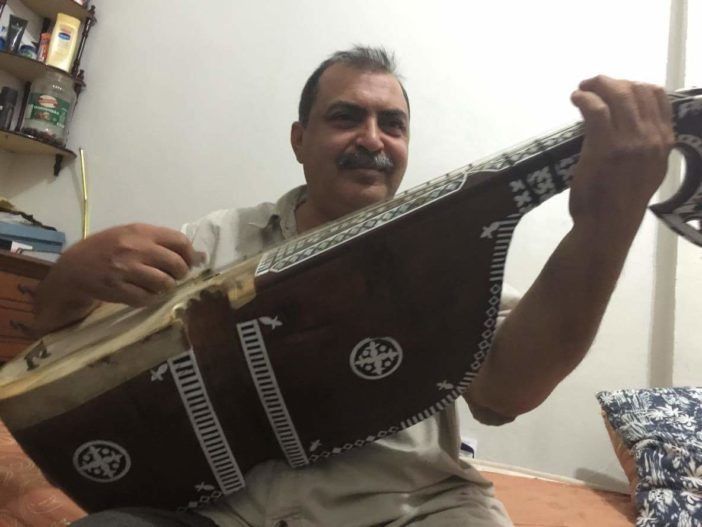Saturday: Legendary Pashtun Composer In Exile Performs On Coney Island Avenue


Sahib Gul, 50, a legendary Pashtun composer with a reputation for speaking his mind, has been living in exile in Midwood since 2008, working at a Gyro restaurant on Coney Island Avenue. Since he fled Taliban extremists in Pakistan, he has barely performed in public.
But thanks to the Brooklyn Arts Council, Gul will be performing on the main stage at the Pakistani Independence Day Mela on Coney Island Avenue, on Saturday, August 20, playing the Rabab and Harmonium while his son plays Tabla drums. This will be his first public show in more than five years. When we asked him why he has only been playing behind closed doors, he said simply that until now, he’s never been asked.
Earlier this week, we sat on the floor in a Midwood apartment with Gul and journalist / translator Majeed Babar, to learn more about the composer’s upcoming performance at the Brooklyn Mela, and his journey to get there — and we heard a richer story of loss, courage and unwavering devotion to his ideals.
Gul is Pashtun, a Muslim ethnic group living primarily in southeastern Afghanistan and northwestern Pakistan. Gul and his family are from Peshawar, the capital of the Khyber Pakhtunkhwa province of Pakistan.
Gul has a round face and dark, friendly eyes. During our interview, a warm smile regularly breaks through his white-speckled mustache — even through tears.
His father was a drummer, and his whole family lived at the Dubgari music bazaar in the ancient city of Peshawar. The bazaar had shops downstairs and wooden balconies overlooking the street, and was filled with drums, guitars and other instruments of celebration, said Babar. But the bazaar has since been wiped of musicians due to a recent wave of Taliban militants, who persecute musicians and artists they say spread ‘un-Islamic’ messages.
But the region has a long and complex history with tribalism, extremism and political invasion, and this isn’t the first time the bazaar has experienced upheaval, Babar told us. In addition, musicians are often undervalued in Pashtun society — even though music itself is celebrated — because of a pervasive discrimination against intellectual professionals over the landowning class.
But Babar said that Gul is a cultural treasure with a strong legacy. “I just don’t want him to die in the dark,” he said, as we sat in plastic chairs on Coney Island Avenue, drinking tea on a steaming hot night before meeting Gul.
Gul has been playing music since he was 10 years old. He began his career playing Rubat, Harmonium and directing for other composers, who soon began to recognize his extraordinary ability to internalize complex musical scores. “Pashto music doesn’t have written notations, you have to remember it — and all 20 musicians at the rehearsal. But when I come back to rehearsal I have it memorized, it’s a spacial thing in me,” Gul said.
Gul was part of a renowned musical group that featured singer Haroon Bacha. Gul began writing songs that replace the traditional romantic ballads with political protests, after a militant mentality began bleeding over into the Pakistani border, according to Gul. One lyric was a revolutionary sounding call, saying “Wake up Pashtoun youngsters, get revolutionary flags,” according to Babar.
“I always listen to my heart, not to other people. Whatever I feel is right, I do. I had a studio, I built it and everything in it, and I started composing music with a message to the youth. I always select poetry that has a message of peace, the message of revolution, the message of a tolerant society,” Gul told us, through Babar’s translation.
After being shunned by colleagues who feared repercussions of his message, Gul built a recording studio in his basement and began working in secret. Artists came from Afghanistan, and all over, for multi-day sessions. But in 2008, Gul’s subversive music caught the attention of militant groups, who showed up at his door one morning with rifles.
One of the men slammed Gul in the mouth over and over with the butt of his rifle, destroyed the recording studio, and dragged him out into the street. “They said ‘We want you to listen. Finish this. This time, we are leaving you alive. But next time, we won’t,'” Gul told us. Still, Gul remained strong.
“I am trying to forget those things that happened to me,” Gul said through tears, recounting the pain of being shunned from work and unable to provide for his family. “At one point these extremists stop every door on me. Business was not coming to me, musicians were not coming to me. One day my youngest son came to me asking me for a few pennies to buy something. My whole family knows that I am a successful musician, but because I had no work even I couldn’t bring bread on my table. So he went to get my shoes and wanted to take out the nails to sell them into thrift. I was just broken,” he said.
“For me that was the time of decision. I was frightened — I had to get 25 stitches and my teeth were gone. I was frightened because I had children, but also I was not frightened because this moment forced me into a decision. I love my wife, she is no longer with me [his wife has since passed away], but she gave me so much courage.”
Gul and Bacha fled the country and came to the U.S., reported the New York Times (the paper reported Bacha’s story in 2008), and acquired American visas. “We wanted to come to the U.S. because at least there is respect for humanity. I got a sense when I was here that everyone can openly and freely practice their religion, there is every kind of people here,” said Gul.

Gul remains committed to his political and personal ideals. “I don’t want to sell my thoughts, whatever I was thinking or doing, that was my own and I was the owner of that. There was people who didn’t like it and stopped doing business with me, always telling me that with this message we cannot take you to the commercial market,” Gul recounted.
But despite being shunned professionally in Pakistan, Gul never stopped playing. “Music is my life. So I stay in practice, playing with friends and family in my house, every week. I keep myself in form and familiar with the tunes.”
Gul is returning to the Mela on Coney Island Avenue after his performance on August, 26 2001 — which left him stateside during the 9/11 terrorist attacks. “It was a pinch in my heart. When I was here in New York, I used to love driving on Ocean Parkway to see the World Trade Towers. When I saw that destruction, I said the world is destroyed now.” Two days ago, Gul’s son brought him to see the Freedom Towers in Manhattan, but for Gul it just wasn’t the same. “I still remember those scenes, those buildings, and [when I saw the Freedom Towers] I had a different, sad feeling,” he said.
“Whoever loves music should come to the performance to get a sense of Pashtoun folk,” said Gul. “They can feel it, they can sense it, how the folk can flourish anywhere.”
Catch Sahib Gul performing traditional Pashtun folk music with his two sons, on August 20 from 2pm to 4pm, on the Mela’s main stage, Coney Island Avenue and Foster Avenue. Preview Pashto music here, on this video featuring singer Haroon Bacha.



